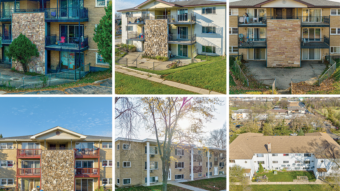The Midwest continues to offer more jobs for the programmers, designers and entrepreneurs working in the tech field. That’s good news for the commercial real estate brokers who sell and the developers who build the offices these tech employees will work at, the multifamily buildings in which they’ll live and the retail centers and restaurants where they’ll spend their dollars.
CBRE recently released its list of the top cities for tech talent growth, a measure of the growth of tech jobs in cities across the United States. Several Midwest cities made the list, including Madison, Wisconsin, which topped it. CBRE said that the number of tech jobs in Madison grew 30.2 percent during the last two years.
Other Midwest cities on the list were fifth-place finisher Kansas City, Missouri, where tech jobs grew by 20.5 percent in the last two years; sixth-place city Omaha, Nebraska, with a growth in tech jobs of 11.5 percent during the last two years; and Columbus, Ohio, which finished in seventh place after seeing its number of tech jobs increase by 12.6 percent in the last two years.
Michael Copella, managing director for the Columbus market for CBRE, told Midwest Real Estate News that Columbus has done a good job of retaining the students that are graduating from The Ohio State University and the area’s other colleges. This has created a steady stream of tech talent that companies can tap.
“It starts with the talent,” Copella said. “That’s part of the reason why we are seeing this resurgence in tech jobs in Midwest cities like Columbus.”
A city needs amenities like plenty of retail, restaurants and entertainment options if it hopes to retain its tech talent. Columbus, like other Midwest cities, has been investing in its urban core to give tech workers plenty to do. Thihs, Copella said, is a key reason why so many university graduates here don’t flee the city after graduation day.
“I think we have turned the corner on that. The city is doing a good job of offering enough to retain that talent,” Copella said. “Columbus has gotten a bit of its swagger back. As the city continues to build out its urban core, as it continues to offer more restaurants and downtown living options, it becomes easier to convince those graduates and other tech talent to stay here.”
One of the biggest benefits that tech workers will find in Columbus? It’s affordable. The city had the lowest cost of living of all the 50 markets in CBRE’s tech talent study.
Today, Columbus has the second-largest labor pool of tech talent among small markets, with CBRE counting 48,230 tech employees here, second only to Charlotte, North Carolina, with 49,830 tech employees. Columbus also had the 10th-largest concentration of Millennials of all 50 markets in the CBRE study, with 20.3 percent of the city’s downtown residents between the ages of 20 and 29 as of 2015.
Not surprisingly, office rents in the city have been on the rise. CBRE reported that Columbus’ office rents have jumped 10.5 percent to an average of $19.23 a square foot. Its office vacancy rate has dipped 590 basis points to 12.3 percent from the first quarter of 2012 to the first quarter of 2017.
Even with these increases, tech companies will find that the cost of doing business in Columbus remains rather modest.
“While real estate prices here have increased, they haven’t increased to what we would see in some of our other Midwest competitors,” Copella said. “Even our office rents are affordable compared to other cities. In general, the cost of real estate is more affordable in Columbus.”
Colin Yasukochi, director of research and analysis for CBRE, said that all of the top cities on CBRE’s tech talent report are seeing positives from the growth of high-tech jobs.
“Tech employment growth has a multiplier effect that positively impacts economic growth, which in turn can have an immense impact on commercial real estate,” Yasukochi said.



